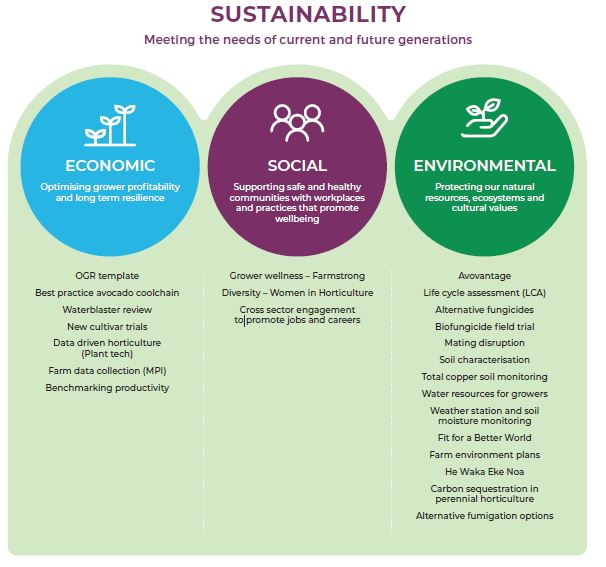Sustainability
At NZ Avocado, our vision is to ensure the long term sustainability of our industry. That sustainability includes the economic, environmental and social aspects of the New Zealand avocado industry.
Avocados grown in clean green New Zealand are already a step ahead of avocados grown in other parts of the world, because of our unique growing environment, responsible use of natural resources, quality industry systems and food safety assurances. However the question is how sustainable is that advantage and what evidence do we need to support this?
Our industry is beginning its own journey to understand and report on the environmental, economic and social sustainability of the industry. Avocados grown in New Zealand have a positive sustainability story however our story will be stronger if we identify and demonstrate, with evidence, specific sustainability elements of the supply chain that highlight that New Zealand avocados are leaving a light footprint on the earth, are supporting strong communities and providing safe work places for a diversity of workers.
We want to build a successful sustainability strategy to ensure that the resources and practices required for the production, the transportation and the sales of avocado, are manageable and profitable for all stakeholders while also maintaining environmental balances.
We need to support the industry’s licence to operate through better understanding its environmental footprint to inform council policy on natural resource use. We need to provide information enabling growers to be economically sustainable and we want to see positive social impacts where we grow avocados, in rural New Zealand.

Sustainability research
Last updated October 2023.
New Zealand avocado Life Cycle Assessment (LCA) study
The New Zealand avocado industry has completed a Life Cycle Assessment (LCA).
Providing the industry with science based research to benchmark our eco credentials and guide our future work.
See a summary of this work in the document below and login to see the full research report.
The study has been peer reviewed and published in the International Journal of Life Cycle Assessment
